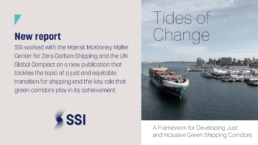New York / London / Copenhagen, December 4 2023 – Transitioning away from fossil fuels must include careful effort to avoid perpetuating the injustices present in today’s global economy, and instead ensure a just and equitable transition. A new report “Tides of Change: A Framework for Developing Just and Inclusive Maritime Green Corridors” co-created by the UN Global Compact, the Mærsk Mc-Kinney Møller Center for Zero Carbon Shipping, and the Sustainable Shipping Initiative outlines the necessary considerations and actions required from companies and governments involved in establishing green shipping corridors around the world.
Recommendations made in the report for a just and equitable transition towards net zero include:
- Ensuring green corridors leverage wider transition aims regionally/locally including improved access to clean energy, the development of decent, sustainable jobs, a diverse and inclusive workforce and capacity building but also improved air quality and preservation of biodiversity and ecosystems regionally.
- Creating decent, sustainable jobs and workforce up-skilling. In the process of establishing green corridors, stakeholders can test and demonstrate how to conduct inclusive social dialogue with affected groups.
- Advocating for strengthening institutional and regulatory frameworks that promote inclusion and protection of the most affected stakeholders.
On the launch of the new joint report, Sanda Ojiambo, CEO and Executive Director of the UN Global Compact said:
“Putting the technologies in place to produce zero emissions fuels for use in the shipping industry will require a complex and coordinated effort across multiple industries and governments. Green corridors will help create the necessary enabling environment between the private and public sector to bring such initiatives to scale. This paper aims to encourage engagement with civil society organizations and communities, ensuring a human-centered approach to the development of green corridors.”
CEO of the Mærsk Mc-Kinney Møller Center for Zero Carbon Shipping, Bo Cerup Simonsen says:
“We need the green corridors to not only demonstrate technical feasibility and regulatory compliance but also address the socio-economic dimensions comprehensively. The right approach can help us better understand and leverage the wider potential, nurture inclusive growth, create green, decent jobs, and enhance social dialogue for a future that honors both our planet and its people.”
Sustainable Shipping Initiative CEO Steven Jones says:
“Shipping’s actions today are building the foundation for a resilient industry tomorrow. In order to do so, we need to ensure that shipping’s decarbonization is sustainable-environmentally, socially and socioeconomically. By taking concrete steps to incorporate principles of fair labor practices, community engagement, and inclusivity, green corridor consortia can play a key role in establishing a sustainable shipping sector that is decarbonized, just, and equitable.”
To see the full report please go to www.zerocarbonshipping.com/publications
— ENDS —
Notes to Editors
What are just green shipping corridors?
Green corridors demonstrate the technical and regulatory feasibility of zero emission shipping with the involvement of stakeholders across the value chain. In the course of the transition away from fossil fuels, careful effort must be made to avoid perpetuating the injustices present in today’s global economy, and instead ensure a just and equitable transition. Because they are closed systems, green corridors can also be used to better understand and leverage the potential social and socio-economic benefits associated with the transition away from fossil fuels, as well as understand and mitigate potential risks and trade-offs.
About the UN Global Compact
As a special initiative of the United Nations Secretary-General, the UN Global Compact is a call to companies worldwide to align their operations and strategies with Ten Principles in the areas of human rights, labour, environment and anti-corruption. Our ambition is to accelerate and scale the global collective impact of business by upholding the Ten Principles and delivering the Sustainable Development Goals through accountable companies and ecosystems that enable change. With more than 18,000 companies and 3,800 non-business signatories based in more than 160 countries, and 62 Local Networks, the UN Global Compact is the world’s largest corporate sustainability initiative — one Global Compact uniting business for a better world. The Ocean Stewardship Coalition is a convening point at the UN Global Compact for ocean related industries, academic institutions, financial actors, governments and UN institutions. For more information, visit our website at unglobalcompact.org.
UNGC Media Contact: Alex Gee, gee@unglobalcompact.org
About the Mærsk Mc-Kinney Møller Center for Zero Carbon Shipping
The Mærsk Mc-Kinney Møller Center for Zero Carbon Shipping (MMMCZCS) is an independent, not-for-profit research and development center established in 2020 with funding from the A.P. Moller Foundation. Our purpose is to guide and accelerate decarbonization of the global maritime industry. Working with our partners, governments, authorities, public sector bodies, scientists, and organizations across the global maritime industry we aim to inform, de-risk decision-making, and spark real climate action. Strategic Partners to the Center include: Alfa Laval, American Bureau of Shipping, A.P. Moller – Maersk, bp, Cargill, CF Industries, Equinor, DP World, Hapag-Lloyd, MAN Energy Solutions, Mitsubishi Heavy Industries, Mitsui, NORDEN, NYK Line, Rio Tinto, Royal Caribbean Group, Seaspan Corporation, Siemens Energy, Stolt Tankers, Sumitomo Corporation, Swire Group, Topsoe, TotalEnergies and V.Group. For more information, please visit www.zerocarbonshipping.com
Center Media Contact: Anders Kongstad, Media & Digital Partner | +45 535 04 179 | anders.kongstad@zerocarbonshipping.com
About the The Sustainable Shipping Initiative (SSI)
The Sustainable Shipping Initiative (SSI) is a multi-stakeholder collective of ambitious and like-minded leaders, driving change through cross-sectoral collaboration to contribute to – and thrive in – a more sustainable maritime industry. Spanning the entire shipping value chain, SSI members are shipowners and charterers; ports; shipyards; marine product, equipment and service providers; banks, ship finance and insurance providers; classification societies; and sustainability non-profits.Guided by the Roadmap to a sustainable shipping industry, SSI works on a range of issues related to enabling and furthering sustainable shipping, including shipping’s decarbonisation, and seafarers’ labour and human rights.For more information, please visit www.sustainableshipping.org
SSI Media contact: Elizabeth Petit González, Head of Partnerships and Communications, e.petit@sustainableshipping.org

